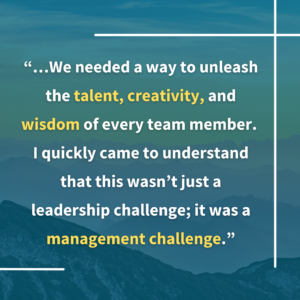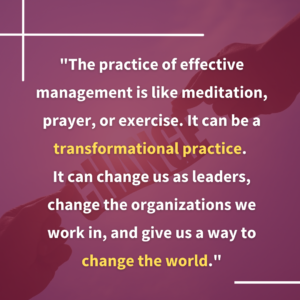Estimated reading time: 4.5 min
“Power without love is reckless and abusive, and love without power is sentimental and anemic.”
— Rev. Dr. Martin Luther King Jr.
As I mark my first anniversary as CEO, I am reflecting on how different it feels from the first time I stepped in to lead a large and growing organization. In 2007, I was promoted to lead the Ella Baker Center for Human Rights (EBC). By then, I had been on staff at EBC for eight years and had held almost every role in the organization. When the board chose me to succeed EBC’s charismatic, visionary founder, Van Jones, we were on the verge of winning significant victories. After years of organizing families of incarcerated youth, our Books Not Bars campaign gained momentum in the fight to close California’s abusive youth prison system. Within just three years of raising the call for green jobs, we were advancing local, state, and national legislation to create pathways into the green economy for communities of color. We were anchoring efforts that dramatically increased statewide voter turnout within communities of color. The organization had a clear, compelling vision and a set of core values that inspired us to collective action, all rooted in love. Love for the communities we served, love for the community of purpose we were building. EBC was where most of us felt held, encouraged, and valued.

Still, as a new ED, I was overwhelmed and under-resourced. I’d been blessed to learn strategy, communication, organizing, and alliance-building from some of the best teachers and practitioners in the country. My mentors and teachers—folks like Nell Myhand, Elisha Miranda, and Boots Riley—gave me the skills and tools I needed to grow from a new organizer to a seasoned campaigner. But this combination of skills wasn’t enough to ensure that I could do my part as ED to help EBC deliver on its mission. I realized we needed a way to unleash the talent, creativity, and wisdom of every team member. I quickly came to understand that this wasn’t just a leadership challenge; it was a management challenge.
I recognized this early on (and consider it my saving grace), but that awareness didn’t come with a road map. At EBC, we had love in spades. Yet, we lacked the rigor to turn that passion into impact we could sustain and scale. I couldn’t find a management coach, consultant, or training program that could help us build a Black-led, multiracial institution like EBC. I had to learn by doing.
I dove into everything I could find on management. There were a number of helpful books offering frameworks for systems and structures. None of them were anchored in EBC’s values. They were race, gender, and justice silent, so I excavated what was helpful and left the rest. I stumbled onto management podcasts. I learned about giving feedback, leading check-ins, setting clear goals, and hiring the right people. Still, none were quite aligned with our values. So, I worked to root these tools in progressive values and the lessons I had picked up as a young activist. To be effective, we have to get clear on the win, be transparent about the process, and create clear lines of accountability and decision-making so your folks know what to expect of you and what you expect of them.

The management tools I learned, rooted in EBC’s values, helped us develop a more rigorous set of collective practices and deliver results for our base of families of incarcerated children and people of color with barriers to employment. At EBC, I got to see what a group of talented, committed people, aligned on a shared vision and organized around a clear set of goals, could achieve together. We closed youth prisons up and down the state of California, we defeated a right-wing ballot measure to create a host of new felonies, and we helped pass the Federal Green Jobs Act of 2007. We did all of these things and more because we forged a set of management practices rooted in love and rigor.
Five years ago, I came to The Management Center because TMC’s tools and frameworks echo the best of what I learned at EBC. At TMC, we work to create, curate, and refine best practices and resources so you don’t have to reinvent the wheel or reinterpret traditional management concepts for a social justice context. You and your team can spend more time winning and less time struggling to work together effectively. From giving and receiving feedback, to hiring well, to cultivating belonging and inclusion, we are here to help you and your team figure out how to manage in a way that’s equitable, sustainable, and results-driven. And, where there are no clear or easy answers, we’re learning, growing, and figuring it out with you.
For me, management is sacred work. As leaders, we have a huge impact on how our people spend their precious time and energy. Those of us charged with management should have the tools and support to be great managers, so we can be a force for good in the lives of our people and teams. The practice of effective management is like meditation, prayer, or exercise. It can be a transformational practice. It can change us as leaders, change the organizations we work in, and give us a way to change the world. Thank you for all you do to build organizations that are changing the world.